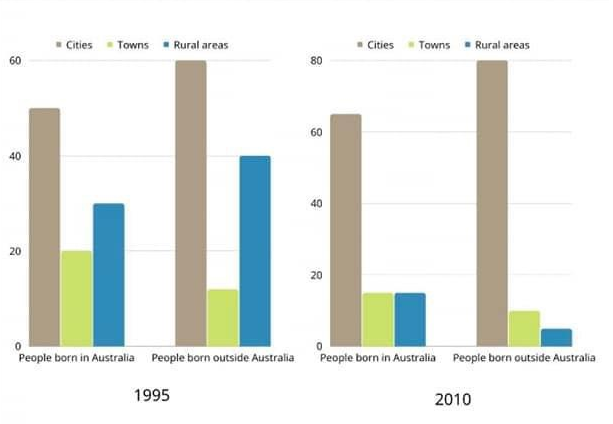[Gurjinder S] Writing Practice Test 1253178
Task 1
You should spend about 20 minutes on this task.
The bar chart below describes some changes about the percentage of people were born in Australia and who were born outside Australia living in urban, rural and town between 1995 and 2010.
Summarise the information by selecting and reporting the main features and make comparisons where relevant.
You should write at least 150 words.

The displayed tabular chart illustrates the deviations in the data about native Australians and non-native ones accommodating in distinct areas in 1995 and 2010.
By and large, it is crystal clear from the rendered chart that people born outside of Australia notched the top slot in both years in terms of living in cosmopolitans.
From the first and the foremost look of the chart it is vivid that in 1995, 50% native Australians lived in the cities, 20% less than this lived in countryside whereas, only 20% chose towns to live. Turning attention towards non-natives, metropolitans accommodated 60% of them, as against merely 10% in towns. 40% were living in rural areas.
Further delving deeper into the chat shows that in the 2010, percentile of native Australians living in cities increased by nearly 13% when towns were the first choice of as many as who chose countryside(15%). The peak of the chart- 80% of migrants in Australias prefered to live in cosmopolitans.The percentage of them in towns and rural areas stayed below 10% for both.
Task 2
You should spend about 40 minutes on this task.
Rich countries often give money to poorer countries, but it does not solve poverty. Therefore, developed countries should give other types of help to the poor countries rather than financial aid. To what extent do you agree or disagree?
You should write at least 250 words.
There is not an iota of doubt that in the present epoch, developed countries bestow aid of hefty amounts of money to struggling territories. However, some mortals deem that it does not mitigate inflation and therefore, aid should be of other sorts. Well, I accord with this ideology to a large extent and the related points are articulated in the subsequent paragraphs.
Fundamentally, the predominant factors evidently triggering towards this are observed here. Firstly, in the times of adversities financial aid does not always reach the citizens of the country who need this aid the most because of the widespread corruption and not much ameliorated judicial system. It only stays in the saving banks accounts of politicians. Therefore, providing other types of help such as giving them food items would be the best notion as food would be guaranteed to reach its destination.
Is there any other supporting point for this? Yes, indeed. It cannot be denied that monetary help is only a temporary solution to a major menace like inflation. However, what developing nations actually need is higher rates of literacy as well as assistance in edifying individuals about technology as it boosts the probability of countries' survival. Therefore, developed nations should consider adding these to their altruistic endeavours.
Nevertheless, there are some opposite side points as well. The first and the foremost, it is true fact that money is the most crucial thing to make someone's existence easier. Also, helping by other means than money might be foolish step in some conditions such as for setting up industries, countries need money and it is only solution to unemployment in umpteen nations. At last, monetary aid becomes paramount in these cases.
To conclude, although financial aid is imperative to a developing territories, yet I believe other sorts of aid would be more helpful to them.
Community’s feedback
Sorry! We couldn't find any contents.
Leaderboard:
| # | User | Score | Time | |
|---|---|---|---|---|
| Kento Nanami |  | 8.5 | 52:31 | |
| Nayef Alhajraf |  | 8.5 | 60:00 | |
| Ella Ruppo |  | 7.5 | 59:39 | |
| 4 | chengxi yu |  | 7.0 | 00:00 |
| 5 | avin chui |  | 7.0 | 59:11 |
| 6 | 癫 火 |  | 7.0 | 59:51 |
| 7 | Li Xuefeng |  | 6.5 | 03:46 |
| 8 | Chanisara Wongkongsang |  | 6.5 | 56:37 |
| 9 | Dan H |  | 6.0 | 50:41 |
| 10 | Carlo Di Giacomo |  | 6.0 | 60:00 |



